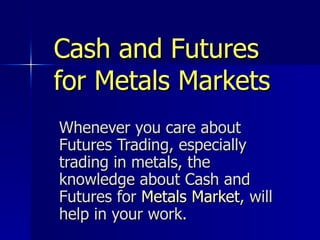
Metals Market : Cash & Futures
- 1. Cash and Futures for Metals Markets Whenever you care about Futures Trading, especially trading in metals, the knowledge about Cash and Futures for Metals Market , will help in your work.
- 2. Why do we need to learn about Cash and Futures? You know, when trading commodity futures markets, to know the difference between actual cash prices vs. futures market prices is essential. Let’s see what are they.
- 3. The futures market prices are what you see in the NYMEX/COMEX. The particular commodity trading at in the future is what it is. While cash prices are what the actual commodity is going for at a certain price in the real market. (For example, a plumber has copper inventory which is stored for use in his plumbing business.)
- 4. There is a certain cash price for his copper that may be higher or lower than what the futures market might be going for. You may wonder why it must be done in this way. You know, the futures market was established for this type of user so that he can hedge himself against the price fluctuations of his inventory of copper.
- 5. He will have a big time business and store a huge amount of copper in a warehouse. There is a specific cash price that has been paid for all of the copper. Over time the price of copper is going to increase or decrease depending on supply and demand.
- 6. We now think of the possible cases. If the price of his copper increases, that will be beneficial to him. Simply, then he can go out and charge for a higher price to his customers for the work done.
- 7. For example, the plumber paid around $1.37 per 25,000 pounds of copper and now the cash price has increased to $1.45. He is then going to make 8 cents on his initial investment on top of the billing of the work that he puts out.
- 8. But, how about if the situation will go in the opposite way - The price of copper falls? Think of the above example in the different case - The price of copper is trading $1.30 and he loses 7 cents! Yes, he won’t be able to get any profit because the money he makes doing the plumbing won’t even offset the loss he has suffered with the cash price.
- 9. Anyway, the plumber needs to consider that the futures market is essential to do his business, because now he can hedge the actual copper that he owns by taking an opposite futures side.
- 10. In what way? The plumber hedges with a short position in the futures market so now if the price of copper goes down he will have covered his actual losses with gains on the short.
- 11. The hedges are not always perfect as some might come out with a minor gain or a minor loss. The fact of the matter is that our man can still operate his business even if the price of copper should happen to fall.
- 12. To end up, as usual, I would like to say that trading in futures and options involves a substantial risk of loss and is not suitable for all investors. Past performance is not necessarily indicative of future results.
